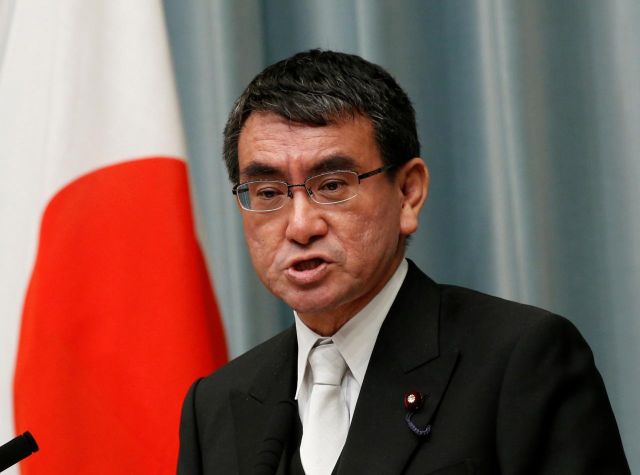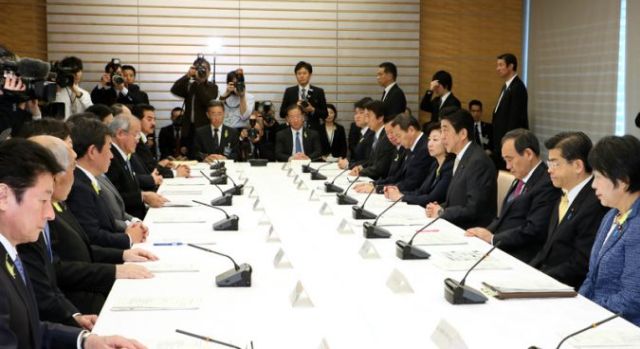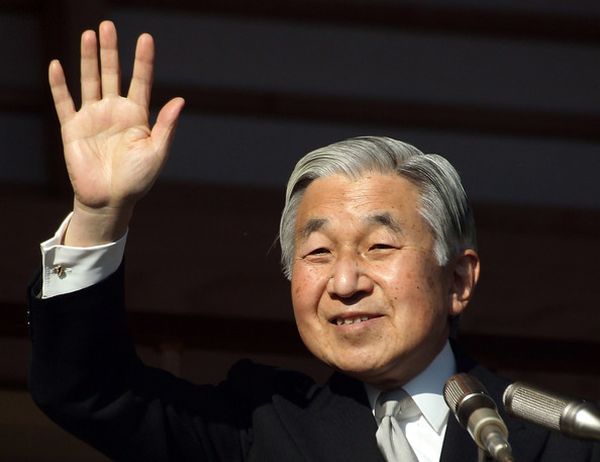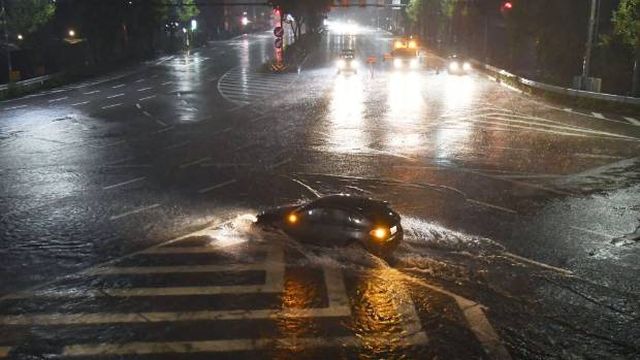
by Editor | May 25, 2021 | World

Japanese Foreign Minister Taro Kono
Amman : Japan will not relocate its embassy from Israel’s Tel Aviv to Jerusalem, Japanese Foreign Minister Taro Kono has said.
In talks with his Jordanian counterpart Ayman Safadi, Kono on Tuesday said that Tokyo considers Jerusalem as one of the final status issues that need to be settled through direct negotiations.
Kono reiterated Japan’s support for the two-state solution and the need to reactivate efforts in this regard, Xinhua news agency reported.
He also voiced appreciation for Jordan’s efforts to attain peace in the Middle East.
US President Donald Trump’s decision to relocate the American embassy from Tel Aviv to Jerusalem violates international law and UN resolutions, said Safadi.
He called for intensified efforts on an international level to facilitate the two-state solution that ensures the creation of an independent state of Palestine on the basis of the 1967 borders with east Jerusalem as its capital.
In 1967, Israel took over East Jerusalem from Jordan and declared the whole city as its “eternal indivisible capital” in 1980. However, it has not been recognised by the international community.
Jordanian Prime Minister Hani Mulki has said during his meeting with Kono on Tuesday that Trump’s decision was “null and void” and in contradiction with the international law.
He added that the Palestinian issue was a central issue in the Middle East. Japan’s support for Jordan, which hosts more than 1.3 million Syrian refugees, was also discussed.
—IANS

by Editor | May 25, 2021 | World
 Tokyo : The Japanese government on Friday imposed new unilateral sanctions on North Korea, which include freezing the assets of Pyongyang-based companies, in response to the launch of the country’s latest ballistic missile.
Tokyo : The Japanese government on Friday imposed new unilateral sanctions on North Korea, which include freezing the assets of Pyongyang-based companies, in response to the launch of the country’s latest ballistic missile.
The new sanctions come as an addition to a long list of punitive measures imposed by Japan which affect North Korean companies of different sectors and senior officials of the Kim Jong-un regime, as well as the movement of citizens between the two countries, reports Efe news.
The government decided to add 19 more companies to the list of businesses whose assets have been frozen, including companies involved in financial services, coal and oil traders, shipping and the supply of workers overseas, Chief Cabinet Secretary Yoshihide Suga said.
With the latest announcement, the total number of North Korean companies or entities subject to Japanese sanctions increased to 56, while 62 individuals have also been blacklisted.
Many of these entities and people also figure in sanctions by the UN Security Council.
In a press conference, Suga said the expanded sanctions, effective Friday, are in response to North Korea’s continued provocative statements and actions as well as a lack of progress on the issue of Japanese nationals abducted by North Korea decades ago.
He added that the move was timed to coincide with a UNSC ministerial meeting on the situation on the Korean peninsula, to be held in New York later on Friday.
The meeting will discuss the latest North Korean missile launch as well as the conciliatory message issued by United States Secretary of State Rex Tillerson this week, amid numerous calls for dialogue between the international community and the Kim Jong-un regime.
The intercontinental ballistic missile, launched by North Korea on November 29, is seen as another step towards the regime’s goal of developing a nuclear weapon capable of reaching US territory.
—IANS

by Editor | May 25, 2021 | World

Japanese Emperor Akihito
Tokyo : Japanese Emperor Akihito is set to abdicate on April 30, 2019, after a nearly 30 years reign and marking an end of an imperial era, the Imperial House Council announced on Friday.
The 10-member Council including Prime Minister Shinzo Abe and members of the Imperial family, made the announcement following a closed-door meeting to deliberate the 83-year-old Emperor’s abdication, reports The Japan Times.
Akihito’s elder son Crown Prince Naruhito’s succession will take place on May 1, 2019.
The last emperor to abdicate was Emperor Kokaku in 1817 in the later part of the Edo Period. In general, Japan’s monarch is not allowed to step down under the country’s legal framework.
Following the Emperor’s rare video message aired in August 2016 in which he signaled his desire to retire, Japan’s parliament enacted a law this June to allow Akihito to pass the Chrysanthemum Throne on to his 57-year-old son.
The law requires the Prime Minister to hear opinions from the Imperial House Council, which is a national deliberative body summoned to discuss important issues concerning the Imperial family, such as marriage of male family members and the loss of Imperial status.
It was last held in 1993 to approve the Crown Prince’s marriage to Masako Owada.
Chief Cabinet Secretary Yoshihide Suga is expected to hold a press conference later on Friday to provide details of the meeting, The Japan Times reported.
After his abdication, Emperor Akihito will be called “joko” (a title for an emperor who abdicates in favour of a successor) and Empress Michiko, 83, will be given the title of jokogo.
Emperor Akihito ascended to the throne soon after the death of his father Hirohito in January 1989.
The Japanese Constitution defines the Emperor, once considered divine, as “the symbol of the state” with no political power.
His abdication will mark the end of the Heisei era.
Akihito is a direct descendent of Japan’s first emperor Jimmu, believed to reign around 660 B.C.
—IANS

by Editor | May 25, 2021 | Business Summit, Events, World

Japanese Prime Minister Shinzo Abe and Philippine President Rodrigo Duterte
Tokyo : Philippine President Rodrigo Duterte on Monday began his two-day state visit to Japan, to address the regional challenges ahead of the Summit of the Association of Southeast Asian Nations (Asean).
Duterte would meet Japanese Prime Minister Shinzo Abe and was expected to exchange views on North Korea’s nuclear and missile programs, the Japanese Ministry of Foreign Affairs said.
Before leaving for Japan, Duterte called for a dialogue with North Korea to curb the ongoing tension in the region, Efe news reported.
“It would be good for America, Japan, (South) Korea and Kim Jong-un to talk and convince him to sit down in a round table (and say) nobody is threatening him.
“There will be no war — and that no one is planning to destroy them,” Duterte said during a press conference in Davao, Philippines, before leaving.
The Japanese government noted that Duterte’s visit, the second since the beginning of his presidency in June 2016, is a good opportunity for the leaders to exchange views before the Asean Summit, which will take place in Manila in mid-November.
Before his meeting with Abe, Duterte would participate in a business event on Monday and meet Foreign Minister Taro Kono, as well as the President of the Japan International Cooperation Agency (JICA), Shinichi Kitaoka.
After holding a joint press conference with Abe, Duterte is set to attend a dinner hosted by the Prime Minister at his official residence.
On Tuesday, the Philippine President will be received by Emperor Akihito and Empress Michiko at the Imperial Palace, which will be his first meeting with the royal couple.
Duterte arrived in Japan early on Monday. His visit was shortened from three to two days due to the tropical storm Saola near Japan, which resulted in over fifty flights being cancelled on Sunday.
—IANS

by Editor | May 25, 2021 | World
 Tokyo : At least seven persons were killed and over 90 injured as typhoon Lan lashed wide swathes of Japan after making landfall in central Japan early on Monday.
Tokyo : At least seven persons were killed and over 90 injured as typhoon Lan lashed wide swathes of Japan after making landfall in central Japan early on Monday.
This season’s 21st typhoon made landfall at Shizuoka Prefecture central Japan around 3 a.m. local time and moved across the Kanto region in eastern Japan, leaving behind a trail of destruction, with rivers bursting their banks and landslides engulfing homes, Xinhua news agency reported.
The typhoon was downgraded to an extratropical cyclone around 3 p.m. east of Hokkaido in northern Japan.
The powerful typhoon has brought heavy rainfall, with the western region of Wakayama Prefecture seeing as much as 800 mm of rain through a 48-hour period to Sunday evening.
According to the weather agency, Mie Prefecture was also hit hard, with the storm dumping 700 mm of rain through the same period, which also caused extensive flooding in parts of Nara Prefecture.
A 63-year-old man was killed after strong winds brought down scaffolding at a construction site in the city of Fukuoka, southwestern Japan. In Yamaguchi Prefecture, in western Japan, a 70-year-old man died after being forced to dive into the sea following his boat’s engine failure.
In Osaka Prefecture, a 68-year-old man was found dead in a submerged car, while a man in his 80s died from head injuries after falling in Osaka city, local media reported.
In hard-hit Mie Prefecture, a 29-year-old man also died in a submerged car and in Wakayama Prefecture, an 82-year-old man died after his house was levelled by a mudslide.
Over 90 people were injured across the nation, according to government data.
Japan’s two major airline carriers, Japan Airlines Co and All Nippon Airways Co cancelled more than 100 flights on Monday, with 25,000 passengers affected.
The Shinkansen bullet train services were suspended along parts of the Tokaido line, and local services in Tokyo and Osaka were disrupted during rush hour Monday morning.
Evacuation orders were issued in some cities and towns, and vote counting following Sunday’s lower house election was delayed in areas where access to polling stations was affected by the typhoon.
—IANS





